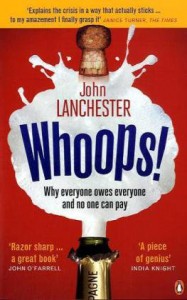The Curious Curator's Book Blog
Contemporary art curator. Student. Book addict. Art lover. Geek. Dreamer. Curious about everything. Check out my website http://thecuriouscurator.com/
Currently reading
Whoops! Why Everyone Owes Everyone and No One Can Pay

Like a lot of people in the world today, I've been struggling for a while to truly understand just how things got to be the way they are right now. Even with everyone and their uncle talking about the crisis, most of what is said concentrates on throwing accusations to one another, and I've missed seeing a systematic, organized account of what went on. I admit, I'm not the most economically savvy person - my education has been focused primarily in the natural sciences and art. But I like to have basic knowledge of pretty much everything (not the healthiest of habits, I know) and not understanding the economic principles behind the crisis upset me, which is why I read this.
This book might just be the most important book I've read this year, so far. It's a great introduction for those who, like me, don't necessarily understand derivatives, credit default swaps, securitization, or how bail outs work. Beware though, this is not for the faint of heart - it's not easy to wrap your head around the sheer craziness of the financial systems, and the unfairness of it all is even harder to accept.
My country is now in the middle of this whole economic shenanigan. A lot of the things in this book, being mostly US and UK-centric, don't apply to us, and our situation can't be explained only by the financial system (our political systems played a big part too), but it's not hard to see that most of what went on globally is a direct consequence of the financial system's irresponsibility. It’s not hard to see that, after the housing and personal credit bubbles burst and financial institutions no longer had that source of high-risk, high-interest rates income, they had to find something else to milk for money. That something, it turns out, is entire countries. And the infamous rating agencies, the central banks, the IMF, they're all part of a broken system that results solely in putting money in the hands of the people who need it the least.
I only wish that more people would read things like this to truly understand what went on. After all, a big part of the problem is that most people had no idea of what was going in. Instead, I suspect most people just won’t find the attention span needed, and will just keep on looking for someone else to blame, not to mention keep on being more concerned with money than with value. That’s human nature for you. As it says on the book:
Public rage is like lightning, and tends to discharge its energies at anyone who has the bad luck to be prominent in the wrong way at the wrong time. As for where the anger would go if it were properly directed, that’s easy to answer: at the banks, and at the governments which let the banks do what they did.
Highly recommended for everyone.









